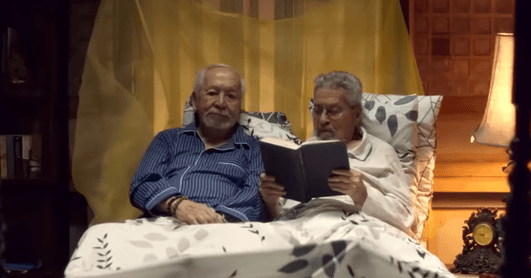SUMMARY
This is AI generated summarization, which may have errors. For context, always refer to the full article.


Last week I was touring Nat, an American friend, around Maginhawa when we hit upon the bright idea of watching a movie. We decided to watch Rainbow’s Sunset at Cinema Centenario. It would be a nice way to end his visit by letting him learn a few things about the local lesbian, gay, bisexual, transgender, and queer (LGBTQ) community before he left for Singapore in a few days. Yet, by the movie’s end, I had a distinct feeling Nat had learned about something entirely different instead: Filipino families and family politics.
Rainbow’s Sunset is still an LGBTQ film. The story revolves around the love between aged gay couple Ramon and Fredo during the latter’s final struggle against cancer. With his old lover fading fast, Ramon packs up and moves in with Fredo to accompany him in his last days.
Surrounding the terminal romance between the two is the conflict it triggers within Ramon’s family. Ramon has been married to wife Sylvia for over 50 years. Luckily she’s understanding, even supportive, of Ramon’s decision to accompany Fredo. But not Ramon’s 3 middle-aged children who all have their own families, and had no clue about their father’s sexuality. It’s hard to believe, as Ramon’s only son Emman says, when your father comes out at the ripe old age of 84.
And therein lies the problem. Because Ramon’s family isn’t just any family, oh no. It’s a budding political dynasty. Ramon – full name Ramon Estrella – is a retired 3-time senator.
As much as Emman is horrified by his father’s sexuality, all the more so is Georgina, Ramon’s second child, who is also the newly elected mayora of a quiet provincial town. Her main gripe against her father is the scandal his newly revealed sexuality will cause because everyone knows the revered senator.
Everyone knows the Estrella family car. The family’s status is in full display when Georgina casually orders Fredo’s nephew to curtain up his uncle’s house – best not to let the neighbors notice them cuddling in the bedroom. Things get even more explicit when Georgina’s husband, a businessman, asks his brother-in-law Emman to tinker with land prices. Just a bit, he says, so he can sell them to a third party for greater profit.
It’s a confusing blithe display of traditional family politics. Emman’s role in corruption is treated as a side plot, a joke, and its consequences are never mentioned again after the deal’s conclusion.
Something of how the movie treats the Estrella family can be seen in its portrayal of Marife, the youngest daughter, who works at Gabriela. She’s the only one among her siblings open to her father’s sexuality. She’s also regularly, and conspicuously, shown working under a large Gabriela banner. It’s almost as if the organization’s name was being used to emphasize this “one good seed” among the Estrella siblings, whose kindness is meant to sanitize her family’s antics.
Rainbow’s Sunset is still a nice movie. Humor infuses most scenes despite, or because of, the near soap opera levels of drama. The 3 starring elderly actors, Eddie Garcia, Tony Mabesa, and Gloria Romero – Ramon, Fredo, and Sylvia, respectively – tell with grace this strange story about love at the terminal stages of life. And the movie mocks other aspects of Filipino conservatism just as well. (It’s probably just a phase, says Emman, who also cannot believe he has a lesbian daughter.)
Perhaps it’s just me. It was a strange experience in the cinema, like having two people watching the movie in my head. There was the part of me that just wanted to enjoy, and another that couldn’t help but wonder what Nat was learning about the country from his visit. Waving him goodbye, I think Rainbow’s Sunset helped show Nat a fuller picture of the Philippines, giving a glimpse into the centrality of family in Filipino life, and how that same centrality lies at the heart of our distinctive brand of oligarchic corruption, than he otherwise could have hoped for. – Rappler.com
Rio Constantino is a sleepy college student who wants to be a biologist someday. Like many others his age, he constantly searches for naps, alcohol, and an internet connection, in that order.
Add a comment
How does this make you feel?
There are no comments yet. Add your comment to start the conversation.